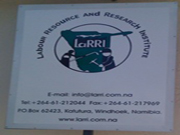Organising security in Namibia

|
With a relatively small population of 2.1 million, Namibia is the country with the greatest disparity between wealth and poverty on the planet. Unemployment stands at more than 50% of the workforce and working conditions in the security industry are brutal. The Namibian Labour Research Institute (LaRRI) will shortly publish a detailed report that examines working conditions in the industry. It is clear from this research that few employers pay any attention to the legal framework for pay, hours and safety. The report, entitled “Guarding wealth but living in poverty” captures not only many of the national problems prevalent in the industry, but also many problems that are consistent right across the African continent in security. It is common for security workers to work 12-hour shifts, 7 days a week, without any ability to leave their post for a meal, or even, toilet break. In many cases, there are no facilities, such as drinking water, toilets, shade in the intense heat or warmth in the cold. Training and development is inadequate in an industry where violence plays a significant role. Many workers are employed by small companies and their employers often fail to meet minimum legal requirements. In the last week 3 security guards were killed when a vehicle transporting them collided with a taxi and another was shot in an armed robbery. Workers start on the Namibian minimum wage for the security industry, which is N$3.80 per hour. By law, they should receive extra payments for working over 10.5 hour shifts, but many workers interviewed reported that they do not get these. There are no increments for length of service and most workers remain on the minimum, even after many years of good service. It is clear from this research that most workers cannot afford to live on these wages; nearly half of those interviewed live in corrugated iron shacks, many do not have electricity or running water at home and most struggle with huge debts. Contracts of employment are rare and one worker interviewed said that workers are hired in English, but fired in Afrikaans or German. UNI, with support from SASK (the Solidarity support organisation from Finland) and PAM (Finnish security union) has commenced work with NATAU to tackle these problems. There are 5 major security employers in Namibia and the British multinational G4S is the second largest with 2000 workers. We aim to build a stronger, more effective union presence in the Namibian security industry, so that workers can improve their pay, work in a safer environment, access medical treatment and work reasonable hours. This is a massive challenge in a country so divided by inequality and exploitation, but one that all parties are determined to see succeed. |


